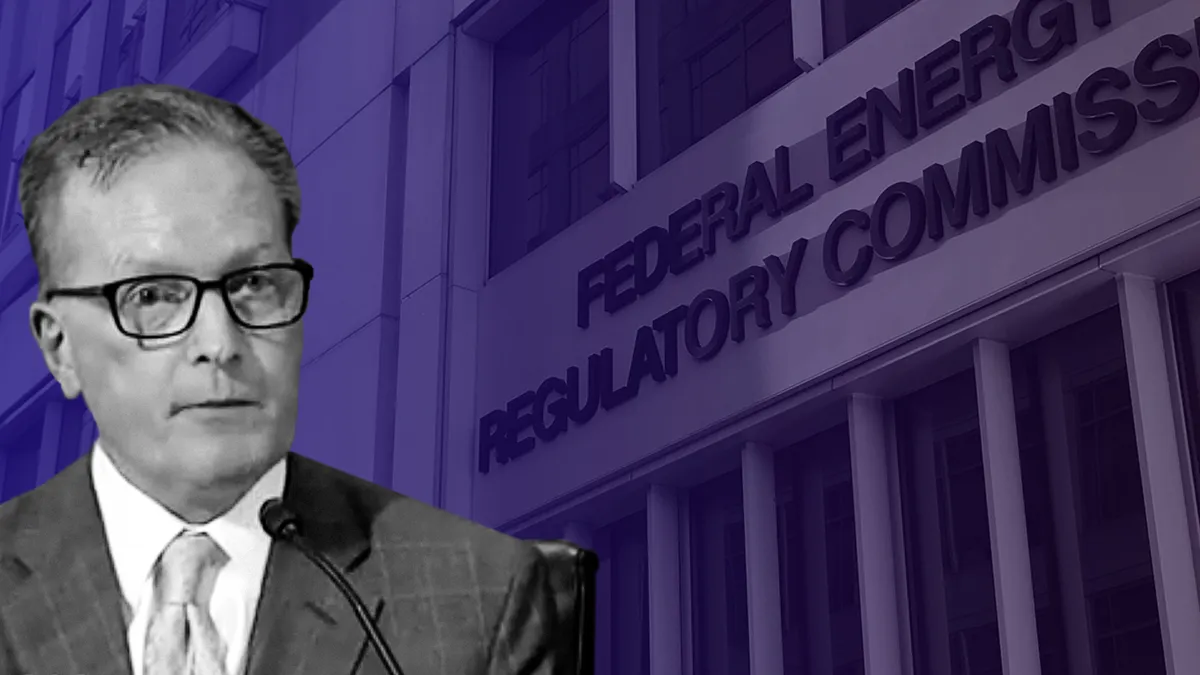Dive Brief:
- The new chairman of the Federal Energy Regulatory Commission on Thursday requested a 30-day extension from the Department of Energy to act on DOE's controversial proposal to provide cost recovery to coal and nuclear plants.
- Chairman Kevin McIntyre, sworn in earlier in the day, noted in his letter to DOE that the commission had added two members in the past two weeks and received more than 1,500 comments on the proposal. The extension will be "critical," he wrote, "to consider the voluminous record and engage fully in deliberations."
- Former Chairman Neil Chatterjee had previously indicated FERC was likely to take some action by next Monday, the deadline of a 60-day timetable requested by DOE. If approved, the extension would give more time for the new commissioners to consider the DOE proposal and potential alternatives, including an interim plan from Commissioner Chatterjee and a rumored proposal from Commissioners LaFleur and Powelson.
Dive Insight:
Newly-arrived Chairman Kevin McIntyre wasted little time exerting his influence on the deliberations over DOE's proposed grid resilience rulemaking. Hours after being sworn in, McIntyre sent a letter to Secretary of Energy Rick Perry requesting another month to examine the DOE plan.
"[T]he Commission has sworn in two new members within the last two weeks," McIntyre wrote. "The proposed extension is critical to afford adequate time for the new Commissioners to consider the voluminous record and engage fully in deliberations."
DOE did not immediately comment on the extension. In his letter, McIntyre noted that the DOE's authorizing act places decisions on timeline extensions directly at the feet of the agency's leader.
"The DOE Act does not limit the means by which deadlines can be altered or amended but instead vests such determinations squarely in the discretion of the Secretary," he wrote.
The request for an extension comes after a frantic autumn of policy debate over the DOE's controversial Notice of Proposed Rulemaking (NOPR), which would provide full cost recovery for merchant power plants that keep 90 days of fuel onsite.
On Sept. 28, DOE requested that FERC consider the NOPR in the unusually short timeframe of 60 days. FERC solicited comments on Oct. 2, receiving more than 1,500 from a wide array of energy stakeholders. The coal and nuclear lobbies supported the proposal, while most other interests worried it could "blow up" wholesale power markets.
Then, on Nov. 2, Chairman McIntyre and Commissioner Richard Glick were confirmed by the Senate. Glick took his seat at the end of November, while McIntrye was sworn in Thursday morning. Under DOE's original timeframe, FERC was set to take action on Dec. 11, only four days after his arrival.
That sequence of events means the new commissioners need more time to study comments and "engage in deliberations," McIntyre wrote.
The commission is already debating an interim proposal from Commissioner Chatterjee that would provide short-term support to coal and nuclear generators while FERC engages in a longer-term assessment of grid resilience. An alternative reportedly pushed by LaFleur and Powelson would ask regional grid operators to issue reports on resilience, but would not offer interim subsidies.
It remains unclear whether DOE is inclined to grant McIntyre's request. At a regulatory conference last month, the head of the DOE's Office of Energy Policy — former coal sector lobbyist Sean Cunningham — said the agency expects FERC to "dutifully" act on its proposal within the 60 day timeframe.
Even if DOE denies the extension, there are few legal consequences if FERC decides not to issue a decision on Monday. Federal agencies frequently miss deadlines, and energy lawyers say DOE has little recourse to force FERC, an independent agency, to act.
"FERC always had the authority to alter the timeline as it saw fit," said Ari Peskoe, senior fellow in electricity law at Harvard's Environmental Policy Initiative. "This appears to be FERC being courteous, but there’s nothing DOE can do to force FERC’s hand on Monday."














